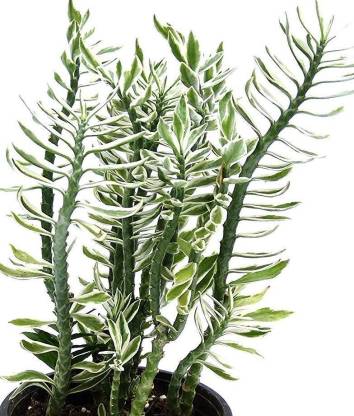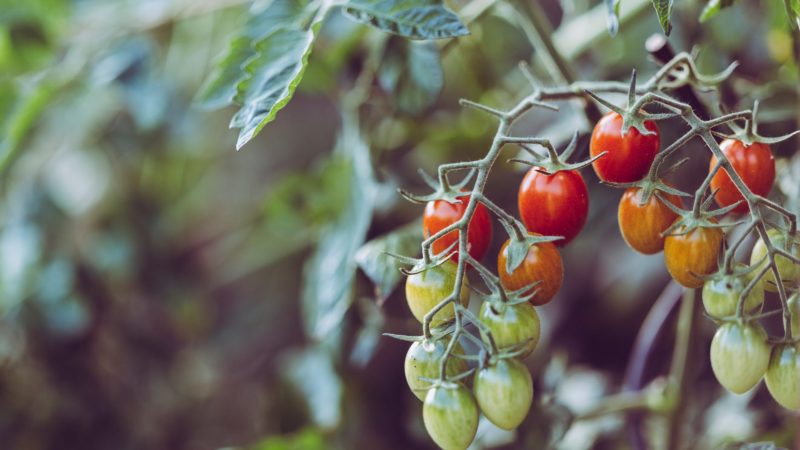Everything About Devils Backbone Plant Care

Devils backbone plant, also known as the Zig Zag plant, is native to the subtropical region of North and Central America. The scientific name of this unique plant is Pedilanthus tithymaloides.
Devils backbone plant has plenty of other names like:
- Redbird cactus flower or Redbird flower
- Jacob’s ladder
- Fiddle flower
- Christmas candle
- ZigZag plant
- Red Slipper Spurge plant
- Slipper Plant
- Japanese Poinsettia
Tips For Caring For The Devil’s Backbone Plant
Here are some common tips for growing a healthy Devils backbone plant.
Size and Growth
The Devil’s backbone is a shrub plant and grows upto a height of 3-4 feet. The thick stems and branches showcase a zig-zag pattern and have small oval-shaped leaves with pointy tips.
When The plant is in its maturing stage, the leaves do not grow as thick. When it matures completely, the leaves start to become bushy. Zig zag plant is a slow-growing plantain that may take many years to mature fully.
Flowering and Fragrance
Devil’s backbone produces slipper-shaped tiny flowers. The plant blooms in the summer season, and the flowers do not last a long time. These slipper flowers are fragrance-free.
The orangish-red flower starts growing from the tips of the stem in tiny slipper-shaped bracts.
Temperature and Light Requirements
Given the fact that Devil’s backbone plant is succulent, it requires plenty of suns. It grows best in places where there is proper indirect sunlight all day. Keep it in places with partial sun and partial shade.
The recommended area to grow the zig-zag plant is in USDA hardiness zone 9-11. It requires temperatures below 40 degrees F. During colder months; it is best to keep it inside.
This tropical plant requires a combination of moisture and sunlight and can thrive indoors if kept in a humid area.
Watering and Feeding
Devils backbone plant is drought-tolerant and grows best in moist soil with regular watering through warmer months. Water moderately in fall and spring weather and hardly during winter months. From spring season to summer, add liquid fertilizer when you water every 3-4 weeks.
Soil and Transplanting
To maintain your zig zag plant in optimal health, use a commercial cactus mix, or you can prepare your own potting soil mixture. You can also try adding a bit of peat moss to absorb the excess water.
Repot the plant every 2-3 years in well-drained soil and get your new pot ready before repotting. To report, pull the plant from the container, shake the clumps of dirt around the roots and then place it into a new pot.
Maintenance and Grooming
As this is a bushy plant, keep pinching the plant tips occasionally. Pinching helps in encouraging plant growth.
What To Do Month by Month
October-March
Devils backbone plants like to rest in colder months, so remember to water sparingly and avoid fertilizing. Provide bright sunlight as much as possible.
April-May
Strat watering often and fertilize every 3-4 weeks. Keep your plant in bright light and something under sunlight. However, avoid direct sunlight as it can scorch leaves.
June-July
Provide a lot of water and light to your zig zig plant. Stop fertilizer at the end of July. This is also the right time to start a new plant using cuttings.
August-September
Lower the watering levels to prepare the plant for winter rest.
How To Propagate Devils Backbone Plant?
The right way to propagate Pedilanthus plants is by cuttings. You can use stem cuttings during early summer. You need only one leaf on every cutting; this way, you will be able to take more cuttings. Make sure to keep the cuttings 3-4 inches long.
Let the cutting dry for many hours, and you will notice white sap on branches. You can put these cuttings in boiling water to allow the milky sap to dry faster. Use perlite and moist sand for soil.
When using cactus sand or mix for repotting soil, transplant the zig-zag plant cuttings after rooting. A cactus mix does not contain the nutrients required by the plants.
Pests and Diseases
The only pests you have to worry about are the scale insects. These appear like small bumps on the leaves. Wipe them off using a cotton swab dipped into alcohol. If you notice that your plant leaves are becoming dull, it is a sign that the plant is getting attacked by spider mites.
If the leaves start to turn yellow and fall off, this means it is getting too much sunlight. Devils backbone plant is a suspect to powdery mildew.
Final Words:
Devil’s backbone plant is a unique house plant. As it is a succulent plant, it is drought tolerant and thrives well in bright and partial sunlight. The plant goes into rest mode during the winter season. Taking care of the zig-zag plant is pretty simple.
If you like this post, do not forget to leave a comment down below.






